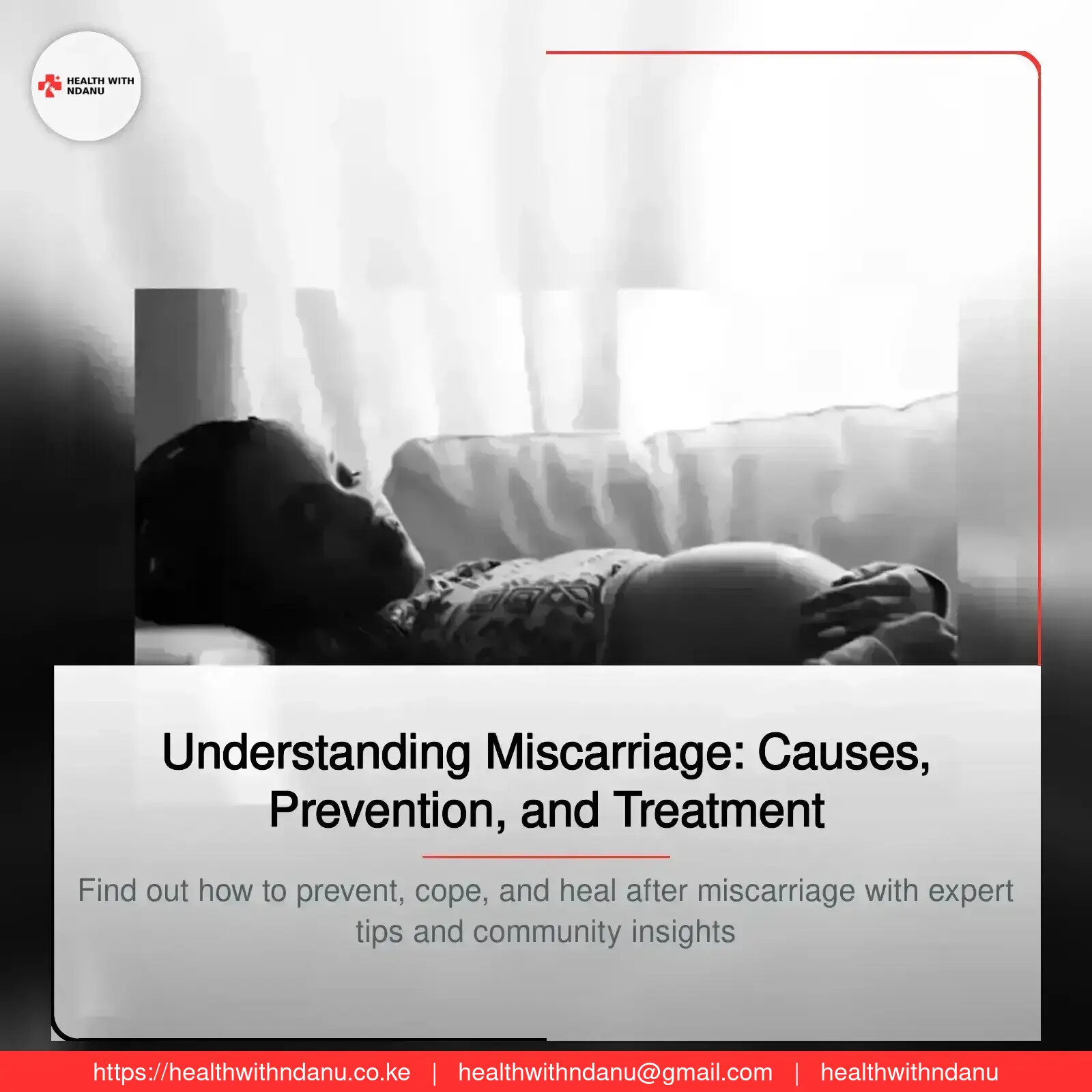Understanding Miscarriage: Causes, Prevention, and Treatment
- by Diana Ndanu
- 23 January, 2025
- 0 Comments
- 6 Mins



Introduction
Miscarriage is a topic that’s deeply emotional and often misunderstood. Whether you’ve experienced one, know someone who has, or simply want to learn more, this guide is here to provide clarity and support. In this article, we’ll define what miscarriage is, explore its causes, discuss how to prevent it, and delve into treatment options. Let’s tackle this sensitive subject with care and knowledge.
What is Miscarriage?
Miscarriage, also known as spontaneous abortion, is the loss of a pregnancy before the 20th week. It’s more common than many realize, affecting approximately 10–20% of known pregnancies. However, the real number might be higher since many miscarriages occur before a woman even knows she’s pregnant.
It’s important to remember that miscarriage is not a sign of failure or something you caused. Often, it’s nature’s way of handling an issue that prevents the pregnancy from continuing.
Common Causes of Miscarriage
While every case is unique, there are several reasons why a miscarriage might occur. Let’s break them down:
1. Chromosomal Abnormalities
This is the most common cause of miscarriage. If a fetus has an irregular number of chromosomes, it may not develop properly, leading to a miscarriage.
2. Hormonal Imbalances
Conditions like polycystic ovary syndrome (PCOS) or insufficient progesterone can affect the ability to sustain a pregnancy.
3. Uterine or Cervical Issues
- Structural abnormalities in the uterus, such as a septum or fibroids, can hinder implantation.
- An incompetent cervix, which opens too early during pregnancy, can lead to miscarriage.
4. Infections
Certain infections, such as rubella, cytomegalovirus, or untreated sexually transmitted infections (STIs), can increase the risk of pregnancy loss.
5. Lifestyle Factors
- Smoking, excessive alcohol consumption, or drug use can harm a developing fetus.
- Exposure to high levels of caffeine (more than 200 mg per day) may also contribute.
6. Chronic Health Conditions
Conditions like diabetes, thyroid disorders, or autoimmune diseases (e.g., lupus) can raise miscarriage risk, especially if they’re not well-managed.
7. Trauma or Stress
Physical trauma or extreme stress can occasionally lead to pregnancy loss, though this is less common.
8. Unknown Causes
Unfortunately, in some cases, the exact reason for a miscarriage remains unknown, which can be particularly challenging for those affected.
Signs and Symptoms of a Miscarriage
Recognizing the symptoms of a miscarriage is crucial, especially for seeking timely medical attention. Common signs include:
- Vaginal bleeding (light spotting or heavy bleeding).
- Abdominal cramps or lower back pain.
- Passing tissue or clots from the vagina.
- A sudden decrease in pregnancy symptoms, like nausea or breast tenderness.
If you experience any of these symptoms, it’s essential to contact your healthcare provider immediately.
How is a Miscarriage Diagnosed?
When miscarriage is suspected, a doctor may:
- Perform an ultrasound to check for a fetal heartbeat.
- Conduct blood tests to measure hormone levels.
- Carry out a pelvic exam to assess the cervix.
- These tests can help confirm if a miscarriage has occurred and guide the next steps.
Can Miscarriage Be Prevented?
While not all miscarriages are preventable, there are steps you can take to reduce the risk and promote a healthy pregnancy.
1. Maintain a Healthy Lifestyle
- Avoid smoking, alcohol, and recreational drugs.
- Limit caffeine intake to less than 200 mg per day (about one 12-ounce cup of coffee).
- Eat a balanced diet rich in fruits, vegetables, whole grains, and lean proteins.
2. Manage Chronic Conditions
Work closely with your doctor to control conditions like diabetes, hypertension, or thyroid disorders before and during pregnancy.
3. Take Prenatal Vitamins
Folic acid, a key ingredient in prenatal vitamins, reduces the risk of birth defects and may lower the risk of miscarriage.
4. Avoid Harmful Exposures
Stay away from toxic substances like pesticides, heavy metals, and radiation.
5. Regular Prenatal Care
Seeing your doctor regularly can help identify and address potential issues early on.
6. Maintain a Healthy Weight
Being overweight or underweight can affect fertility and pregnancy. Aim for a healthy weight before trying to conceive.
7. Reduce Stress
While stress alone doesn’t cause miscarriage, managing it can contribute to overall health during pregnancy. Consider relaxation techniques like yoga, meditation, or deep breathing exercises.
Treatment After a Miscarriage
The treatment process depends on the stage of the miscarriage and individual circumstances.
1. Expectant Management
In some cases, the body naturally expels all pregnancy tissue without medical intervention.
2. Medication
Doctors may prescribe medications to help the uterus expel remaining tissue, speeding up the process.
3. Surgical Procedures
- Dilation and Curettage (D&C): This procedure removes any remaining tissue from the uterus.
- Vacuum Aspiration: A less invasive option often used in early miscarriages
4. Emotional Support and Counseling
Experiencing a miscarriage can be emotionally devastating. Seeking support from a counselor, support group, or loved ones can help you process your feelings and begin to heal.
Coping After a Miscarriage
It’s natural to feel a wide range of emotions after a miscarriage—grief, sadness, anger, or even guilt. Remember, you’re not alone, and it’s okay to seek help.
- Talk About It: Share your feelings with a trusted friend, family member, or therapist.
- Join a Support Group: Connecting with others who’ve had similar experiences can be incredibly comforting.
- Practice Self-Care: Focus on activities that bring you comfort, whether it’s reading, journaling, or spending time outdoors.
- Allow Yourself Time: Healing—both physical and emotional—takes time. Be patient with yourself.
Trying Again After a Miscarriage
Many women go on to have healthy pregnancies after a miscarriage. Here’s what to keep in mind:
- Timing: It’s generally safe to try again after one to three menstrual cycles, depending on your doctor’s advice.
- Pre-Pregnancy Checkup: Discuss any underlying issues or risk factors with your doctor before conceiving again.
- Stay Positive: While it’s natural to feel anxious, remember that most women who experience miscarriage can successfully carry future pregnancies to term.
Final Thoughts
Miscarriage is a heartbreaking experience, but understanding its causes and learning how to prevent and treat it can provide some comfort and hope. Whether you’re supporting someone who’s gone through it or navigating the journey yourself, remember that help is available, and brighter days are ahead.
Have questions or experiences to share? Let’s continue this conversation and help break the stigma around miscarriage. Your voice matters!
Got Your Own Experience? Share with us
Kategoria Maarufu
Blogu Zinazotembelewa Zaidi
Daily Newsletter
Get all the top stories from Blogs to keep track.



